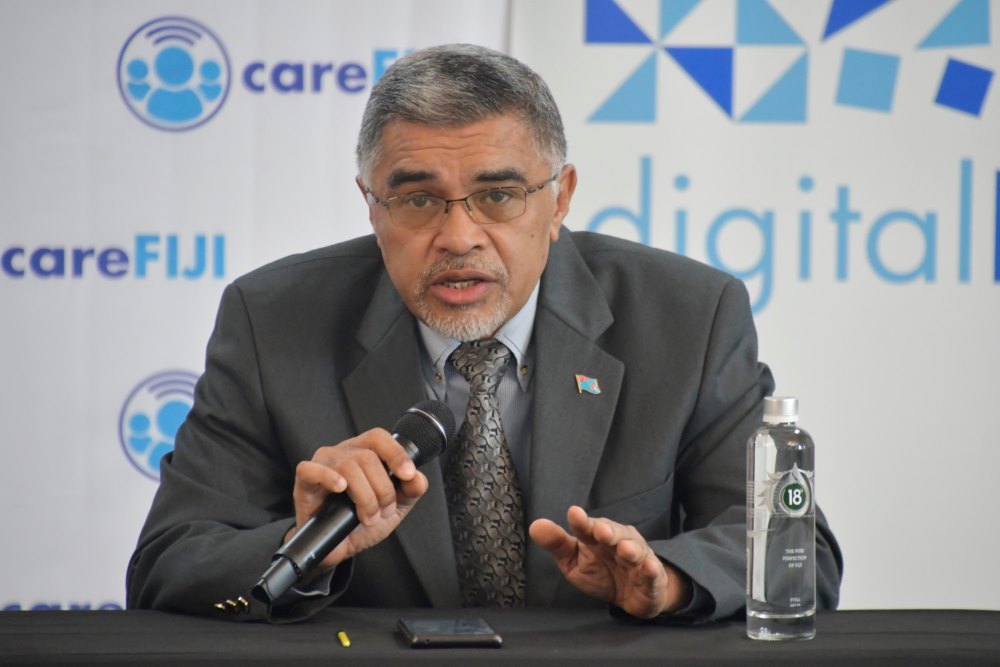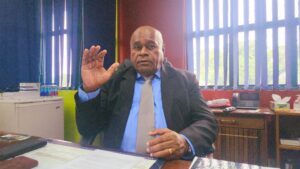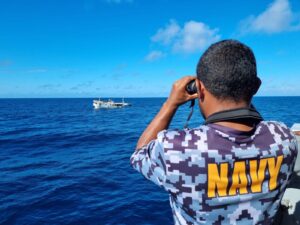Fijian authorities have identified 336 people – of 69 first-generation and 267-second generation contacts – who may have come into contact with Fiji’s 73rd COVID-19 case involving a military officer, who they said did not “violate protocol”.
Authorities say that while this is still a border quarantine case, there is a serious risk that cases could have entered the community, thus the need for a wider search scope and the need for everyone to continue to observe COVID19 safety precautions including avoiding non-essential travel and gatherings.
Since yesterday, the 69 first-generation contacts were placed in quarantine and will remain there for 14 days. Of the 69 people tested, 56 came out negative. The results of the other 13 people will be known tomorrow. Authorities also rounded up and tested the 267 second-generation contacts whose results will be released gradually from tomorrow as well. Depending on these results, the ministry is expected to update the public on any new health restrictions.
“That is why we are acting with decisive precaution to prevent any widespread transmission from this case,” Fiji’s Ministry of Health Permanent Secretary Dr James Fong said.
“We have identified 69 first generation contacts. These are individuals who were working in the quarantine facility during the window of transmission – and while they may not all be close contacts of this case, we have deliberately widened our definition of a first generation contact to cast a wide net out of an abundance of caution.
“We have identified and contained, 267 second generation contacts. These are individuals sharing a household with the first generation contacts of our index case. These individuals were also taken into quarantine facilities last night and are being tested.”
Dr Fong says these results will also determine whether or not they need to expand their contact tracing scope.
“Right now, our priority is obtaining the clearest picture possible about the potential length of this chain of transmission.”
Case Particulars (Extracted from Dr James Fong statement at today’s press conference in Suva):
The soldier in question tested negative for the virus during routine testing for border staff on the 10th of April 2021. Despite showing no symptoms, he was tested again on the 17th of April in line with our border quarantine procedures. That was when the positive result was registered. We suspect he contracted the virus from two Fijian citizens who returned to Fiji from India on the 10th of April. They both tested positive for the virus and were transported to the isolation ward of Lautoka Hospital on the Friday the 16th of April. So, we are dealing with a transmission window from one to six days. The soldier was staying onsite at the quarantine facility, as is the protocol for all our military personnel on rotation through border quarantine duties. He is reported to not have left the site at any time during the transmission window. However, given that the potential window for transmission may be prolonged, we have to assume that the soldier had some contact with daytime staff of the quarantine facility, including hotel workers. These are staff who have gone on to enter public spaces.
This soldier in question had already received one dose of his COVID-19 vaccine. We know that offers some level of protection. However, we cannot say with certainty whether or not this has limited his transmission of the virus to others, even though global data does suggest that viral transmission is reduced even after one dose.
What we can say is that this individual did not violate protocol. He was wearing the proper PPE and never left the facility to enter the public. His interaction with the daytime staff of the quarantine facility was in keeping with our protocols however given the potentially wide transmission period we have to spread our contact tracing net wide and early. Fiji’s security protocols have done exceptionally at keeping us safe, and we’ll use this opportunity to strengthen them further, particularly to prevent the spread of new, more contagious variants.
We have always said that our containment of COVID-19 has depended on the commendable efforts of our frontline border staff, but none of us should become complacent. As multiple border breaches in other countries has shown, as long as this virus is out there in the world, we will remain at risk. Actually, this incident is a test of our next level of containment – which is the ability of our response teams to quickly identify cases, isolate and treat them, and quarantine their contacts. And with 336 primary and secondary contacts identified and brought into quarantine facilities just overnight, we are off to a good start, thanks to the tireless efforts of our teams on the frontlines.
However, this incident reminds us again that the only sustainable way in which we protect Fijians will be through COVID-19 vaccines and our hands, face and space, covid safe behaviour. Our border quarantine system has performed exceptionally well, but it is not perfect. Immunity, through vaccines, is the only real long-term solution. As we immunize more of our people, we expect to see health restrictions relax. However, our focus at the present time is on containing the potential spread of the virus from this case. The Fijian public can assist that effort by employing the good habits we have developed over the past year. Wash your hands, maintain physical distance where possible, stay home and report your symptoms if you are feeling unwell. And when you have the chance to be vaccinated, come forward.
Our next batch of vaccines arrive tomorrow and we continue to work on procuring WHO-approved vaccines to be brought to our shores to be administered into arms. Register online, or come to one of our, in-person vaccination registration centre.









